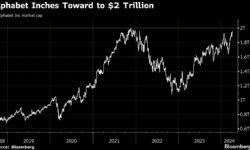

(Bloomberg) — Russia is working to undermine US support for Ukraine ahead of the 2024 election, while Chinese influence campaigns aim to divide Americans and undercut their faith in democracy, according to new research from Microsoft Corp.
Most Read from Bloomberg
But both countries’ persistent efforts to shape American politics through propaganda and cyberattacks have been less pronounced during this year’s election cycle than they were in 2016 and 2020, the company said in a report published Wednesday. It also found that widespread fears of voters being influenced by deepfake videos made with artificial intelligence haven’t yet happened, while simpler efforts have been more persuasive.
Representatives for the Chinese and Russian embassies in Washington didn’t immediately respond to requests for comment.
Microsoft researchers found several “Russia-affiliated” efforts to push disinformation to hurt Ukrainian President Volodymyr Zelenskiy or cause Americans to question their government’s support for Ukraine as it continues to battle Russia’s 2022 invasion. These campaigns have been conducted in English and Spanish, and they often take the form of purported whistleblowers or amateur journalists posting disinformation that is then covered by seemingly unaffiliated websites, the report states.
Microsoft found that the most prolific pushers of these narratives “are backed by or affiliated with” the administration of Russian President Vladimir Putin and that the disinformation gets taken up by Americans who are likely unaware of its source. The company also said it’s observed an uptick in recent months of a hacking group affiliated with the Russian military targeting Western policy think tanks.
China has made greater use of AI to create and enhance images, memes and videos meant to stoke controversy in the US and deepen existing social divisions, Microsoft found. For instance, social media accounts linked to China have pushed conspiratorial content, such as posts with AI-generated images of burning coastal roads that blame the US government for the summer 2023 wildfires on the Hawaiian island of Maui.
The researchers concluded that this sort of relatively simple digital forgery drew attention while there have been few signs of people being broadly swayed by sophisticated deepfake videos made with AI.
“Rarely have nation-states’ employments of generative AI-enabled content achieved much reach across social media, and in only a few cases have we seen any genuine audience deception from such content,” the report states.
It also concluded that faked audio has been more effective as propaganda, as it’s easier to make and harder to debunk than video.
This sort of deception caused alarm in January, when a doctored audio message of US President Joe Biden circulated discouraging voters in New Hampshire from casting ballots in the state’s Democratic primary. In that case, the audio was traced back not to a foreign government but rather an American political operative.
Most Read from Bloomberg Businessweek
©2024 Bloomberg L.P.
EMEA Tribune is not involved in this news article, it is taken from our partners and or from the News Agencies. Copyright and Credit go to the News Agencies, email [email protected] Follow our WhatsApp verified Channel









